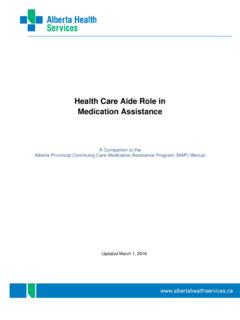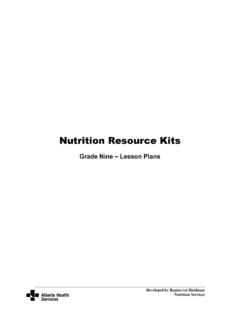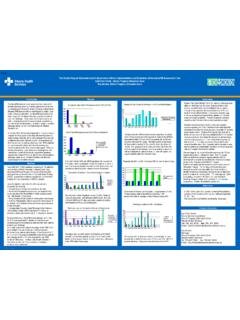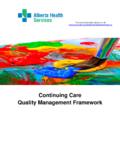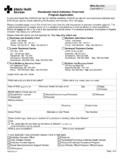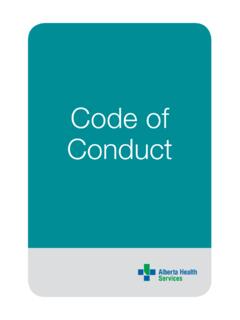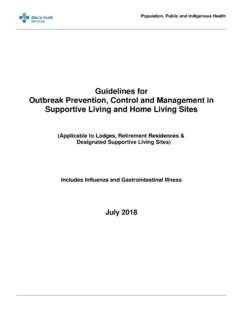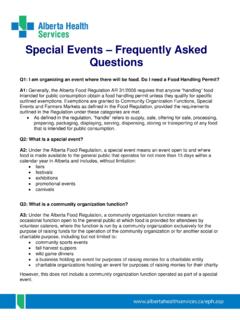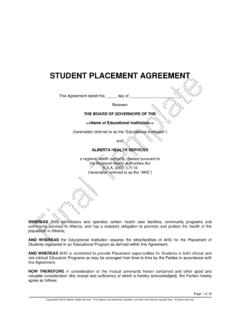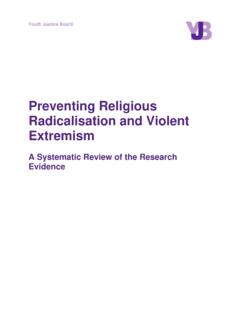Transcription of Invermectin Evidence Review Update Oct 5, 2021 Scientific ...
1 Ivermectin Evidence Review Update Oct 5, 2021, AHS Scientific Advisory Group The AHS Scientific Advisory Group (SAG) and the COVID-19 Therapeutics Working Group continue to monitor new Evidence on ivermectin. After Review there continues to be insufficient Evidence of benefit, and the previous recommendations continue to be upheld: At this time, ivermectin should not be prescribed or taken to prevent or treat COVID-19 (outside of a clinical trial, although SAG is currently not aware of ongoing trials in Alberta). The SAG and the Therapeutics Working Group will continue to monitor and assess new Evidence on ivermectin as it is published. Several high quality randomized controlled trials are being conducted to further study the use of ivermectin for COVID-19; this Review and recommendations will be updated as new Evidence comes to light.
2 Since the previous reviews, there were two significant updates on the Evidence for ivermectin use in COVID-19 that SAG would like to comment on: 1. Guidelines and Evidence Review Update : Fraudulent Data Withdrawn A recent Cochrane systematic Review by Popp et al. (July 2021) is in alignment with AHS and other jurisdictions (including the US National Institutes of Health, the World Health Organization, Health Canada, and the US Food & Drug Administration. It concludes that the reliable Evidence available to date does not support the use of ivermectin for treatment or prevention of COVID-19 (outside of well-designed randomized trials). The authors found that the available studies varied widely in the dosages used, the other medications included as comparators, and the outcomes examined, and that many of the studies were at high risk of bias (meaning any differences noted across groups were likely due to other factors).)
3 This Cochrane Review excluded a study (Elgazzar et al.) that contributes to the positive findings noted in some other meta-analyses. It should be noted that the Elgazzar et al. RCT, which reported results that were very favorable to ivermectin, has been withdrawn from the preprint server for possible data fraud, so any reviews or meta-analyses that include it are not valid. For details on the issues identified in the Elgazzar et al. study, please see the article published in Nature (some of the issues include duplicated patient records, patients whose records indicate they died before the study started, and phrases that were identical to other published work). The SAG is aware that there has been considerable social media attention related to ivermectin as an effective therapy for COVID-19, in part due to the study by Elgazzar and meta-analyses using that study as well as other lesser quality observational trials with significant data issues including impossible numbers, unexplainable mismatches between trial registry updates and published patient demographics, and nonfeasible timelines.
4 Given the ongoing investigation of these studies, more may be withdrawn over the coming months. Concerns regarding the lack of assessment of quality of these studies have been published, stating that relying on low-quality or questionable studies in the current global climate presents severe and immediate harms. The enormous impact of COVID-19 and the consequent urgent need to demonstrate the clinical efficacy of new therapeutic options provides fertile ground for even poorly evidenced claims of efficacy to be amplified, both in the Scientific literature and on social media. This context can lead to the rapid translation of almost any apparently favorable conclusion from a relatively weak trial or set of trials into widespread clinical practice and public policy. 2. Commentary on Ivermectin Use in Uttar Pradesh, India Multiple social media sources have also reported that ivermectin might have been responsible for reducing COVID-19 cases in Uttar Pradesh, India, with claims that the low rate of new cases in spite of low vaccination rates in this region is related to distribution of ivermectin-containing medication kits.
5 There are several potential issues with these lines of reasoning, including: Both observational trial data and real world data sources need careful evaluation using these key principles of Review : expert peer Review of Evidence , assessment of errors in reporting, assessment of due Scientific diligence, and careful consideration of confounders. These principles have not been applied to this data. This observational data is much lower quality Evidence compared with randomized trials (which also can vary in quality and require assessment). There is variability in assessment of infection rates and outcome reporting at a population level, as well as confounding. Multiple sources suggest the infection rate and death toll of COVID-19 in India in general, and Uttar Pradesh in particular, has been underestimated and current transmission is likely lower because of post infection immunity in survivors given prior waves of the pandemic o India s death toll (and associated case counts) is estimated to be at least 7-13X higher than reported, suggesting actual population infection rates have been 60-70%, confirmed by seroprevalence data.
6 Multiple resources indicate that cremations outstripped official death estimates considerably in this area. o A preprint analysis of excess mortality for India related to COVID-19 (which found up to 2% of the population died up to June, 2021) had to omit data from Uttar Pradesh because of significant reporting irregularities (including districts that reported NO deaths for months) o Public health seroprevalence data reported by the Center for Global Development suggested extreme underreporting of cases and deaths in Uttar Pradesh, and Indian Council of Medical Research data (reported by press release) showed 71% seroprevalence in Uttar Pradesh in spite of only 29% initial dose vaccinated in July. It is also noted that many districts in India used ivermectin over a period in which the Evidence was less clear, based on national guidelines, so regions cannot be compared based on use or non-use.
7 Ivermection and hydroxychloroquine have recently been removed from the national COVID-19 guidelines in India for lack of efficacy. In summary, this would suggest Uttar Pradesh had a devastating prior COVID-19 surge with high case rates and significant uncounted mortality, with current Evidence of partial population immunity in people who survived COVID-19 infection and increasing numbers of vaccinated people. Major COVID-19 Guidelines and Manufacturers Statement Do Not Support Ivermectin Use, in Part Given Safety Concerns As summarized in the Cochrane Review , national and international guidelines regarding the use of ivermectin for the treatment or prevention of COVID 19 have been developed over the past 12 months. Recommendations from the WHO, updated 31 March 2021 (WHO 2021b); European Medicines Agency, updated 22 March 2021 (EMA 2021); Infectious Diseases Society of America, updated 13 February 2021 (IDSA 2021); and the COVID Management Guidelines India Group, updated 15 May 2021 (COVID Guidelines India 2021), concur that ivermectin should only be used for treatment of COVID 19 in the context of clinical trials.
8 The EMA additionally advises against the use of ivermectin for prophylaxis outside RCTs (EMA 2021). The US NIH guidance updated on 11 February 2021 describes 'insufficient data' to permit a recommendation for or against the use of ivermectin for the treatment of COVID 19 (NIH 2021). In addition it is notable that Merck, the manufacturers of ivermectin, have concluded that there is: No Scientific basis for a potential therapeutic effect against COVID-19 from pre-clinical studies; No meaningful Evidence for clinical activity or clinical efficacy in patients with COVID-19 disease, and; A concerning lack of safety data in the majority of studies. Furthermore, Merck states that We do not believe that the data available support the safety and efficacy of Ivermectin beyond the doses and populations indicated in the regulatory agency-approved prescribing information.
9 As noted in the SAG Review that follows, the product monograph for Stromectol oral ivermectin tablets reports that no fatalities have been observed in humans due to overdose of medical-grade ivermectin (Merck Canada Inc., 2020). Consumption of veterinary-grade ivermectin formulations, which contain ingredients not used in human medicines, most commonly results in rash, contact dermatitis, edema, headache, dizziness, asthenia, nausea, vomiting, and diarrhea (Merck Canada Inc., 2020). The US Food & Drug Administration warns that even the levels of ivermectin for approved human uses can interact with other medications, like blood-thinners. You can also overdose on ivermectin, which can cause nausea, vomiting, diarrhea, hypotension (low blood pressure), allergic reactions (itching and hives), dizziness, ataxia (problems with balance), seizures, coma and even death.
10 They also warn that the doses used for animals are often highly concentrated because they are intended for use in large animals, and that these doses can be highly toxic for humans. Furthermore, many of the inactive ingredients found in products for animals are not intended for use in humans. Several high quality randomized controlled trials are being conducted to further study the use of ivermectin for COVID-19; this Review and recommendations will be updated as new Evidence comes to light. Prescribing Ivermectin for COVID-19 is presently outside the usual standard of care and may pose increased risk (including potential medication adverse events); there is not a reasonable expectation of benefit based on current Evidence . The College of Physicians and Surgeons of Alberta and the Alberta College of Pharmacy issued a joint statement on September 23 expressing concern over misinformation being spread by a small number of pharmacists and physicians about ivermectin.
